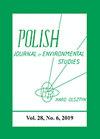How Do Information Resources Influence the Public Environmental Risk Perception? A National Survey in China
IF 1.3
4区 环境科学与生态学
Q4 ENVIRONMENTAL SCIENCES
引用次数: 0
Abstract
Information shapes people’s psychological risk perception and attitude to governmental policies, which provides managerial insights to risk communications. Due to the variance in the content, timing, and frequency of information channels, each risk information channel gains different credibility from the public. In turn, information channels with high credibility might have a stronger effect on the public’s risk perception than channels with low credibility. We conducted a nationwide survey (Asia Barometer Survey 2015) to explore citizens’ fundamental understanding of general environmental risk perceptions and to examine the informational factors that influents residents’ risk perception. The results reveal that environmental information exposure to netizens is strong, online information is easily accepted by citizens, and other information channels do not have significant effects. Factors such as age, educational attainment, household income, and location (urban/rural) were found to be related to the degree of risk perception, but gender was not. The provision of information over social media reshapes public risk perception by increasing self-reported knowledge, reducing trust, and making people more fearful. The study revealed the diverse effects of information sources of media on risk communication.信息资源如何影响公众的环境风险认知?中国全国调查
信息影响着人们的心理风险认知和对政府政策的态度,这为风险沟通提供了管理启示。由于信息渠道的内容、时间和频率不同,每种风险信息渠道在公众中获得的可信度也不同。反过来,可信度高的信息渠道可能比可信度低的渠道对公众的风险认知有更强的影响。我们在全国范围内开展了一项调查(2015 年亚洲晴雨表调查),以探讨公民对一般环境风险认知的基本理解,并研究影响居民风险认知的信息因素。结果显示,网民的环境信息接触率较高,网络信息容易被公民接受,其他信息渠道的影响并不显著。研究发现,年龄、教育程度、家庭收入和地理位置(城市/农村)等因素与风险认知程度有关,但性别与风险认知程度无关。社交媒体提供的信息通过增加自我报告的知识、降低信任度和使人们更加恐惧来重塑公众的风险认知。研究揭示了媒体信息来源对风险交流的不同影响。
本文章由计算机程序翻译,如有差异,请以英文原文为准。
求助全文
约1分钟内获得全文
求助全文
来源期刊

Polish Journal of Environmental Studies
环境科学-环境科学
CiteScore
3.10
自引率
11.10%
发文量
430
审稿时长
4 months
期刊介绍:
One of the most important challenges facing the contemporary scientific world are problems connected with environmental protection. Intensive development of industry and agriculture has led to a rise in living standards on one hand, but an increase in environmental degradation on the other. This degradation poses a direct threat to human health and life. Solving these ever-increasing problems which seriously endanger our civilization require the united efforts of scientists and field researchers of many branches.
The "Polish Journal of Environmental Studies" publishes original papers and critical reviews on the following subjects:
-Basic and applied environmental pollution research, including environmental engineering
-Pollution control of atmospheric, water (marine and fresh), soil and biological materials
-Determination of harmful substances, including their metabolic breakdown patterns
-Analytical methods for metabolic breakdown patterns or other chemical degradation patterns in the environment and in biological samples
-Development of new analytical methods, instruments and techniques for controlling pollutants
-Circulation of pollutants in the environment and their effect on living organisms
-Environmentally oriented catalysis
-Hazards to human health and safety
-Waste utilization and management
-Land reclamation
-Conference reports, scientific and technical reports and book reviews
 求助内容:
求助内容: 应助结果提醒方式:
应助结果提醒方式:


